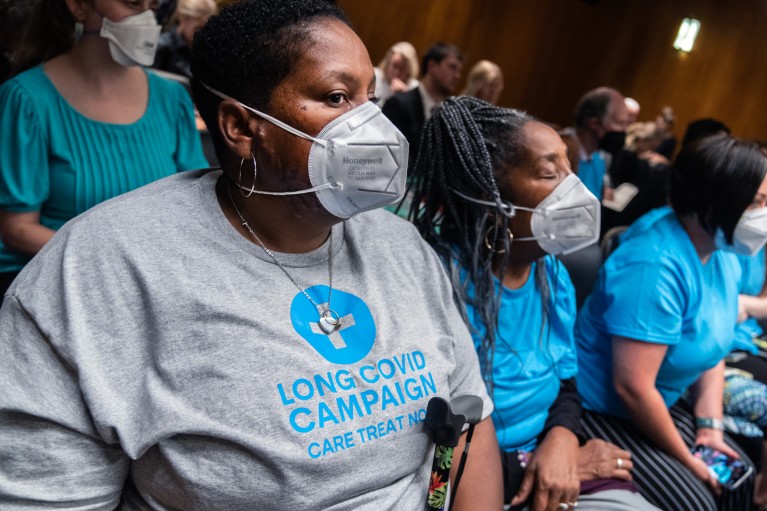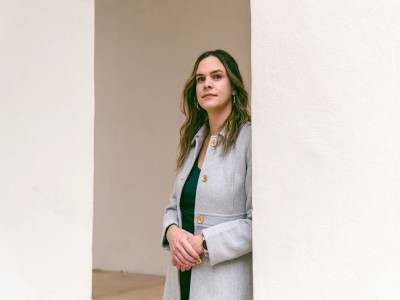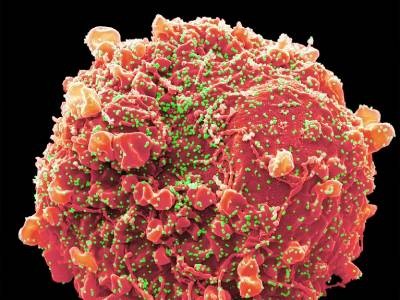
Long COVID advocates attend a budget hearing in the US Senate.Credit: Tom Williams/CQ-Roll Call, Inc/Getty
Long COVID advocates and researchers in the United States have done the extraordinary. After a bruising battle, they managed to revive some of the research grants cancelled by the administration of President Donald Trump ― a rare victory for science as Trump’s team slashes funding and fires federal scientific staff.
The crisis began in late March, when the US National Institutes of Health (NIH) terminated the funding for dozens of long-COVID projects. Activists and researchers began a dogged advocacy campaign, including an eleventh-hour effort to sway a sympathetic member of Congress to intervene, according to an employee of the US Department of Health and Human Services (HHS), which oversees the NIH. (The employee requested anonymity because they were not authorized to speak to the press.) Within days, the cuts had been reversed.
But the administration’s termination of an array of infectious-diseases research suggests a rocky path ahead for long-COVID research. Now activists and scientists are both anxious and hopeful as they brace themselves for the potential of future cuts to federal support.
“The long COVID patient community is reeling and flabbergasted by what they’re seeing,,” says Emily Taylor, president of the Solve ME/CFS Initiative and based in Glendale, California. “We’ve been telling congresspeople, ‘Stop cutting, first thing. Stop hurting us. Stop the pain.’”
The HHS, which includes the NIH and other health agencies, did not respond to a request for comment.
Long COVID’s reach
Over the past two months, US President Donald Trump’s new administration has cancelled or delayed thousands of biomedical research grants, including those for research on COVID-19.
When asked about the COVID-19 cuts, a spokesperson for HHS told Nature on 26 March, “HHS will no longer waste billions of taxpayer dollars responding to a non-existent pandemic that Americans moved on from years ago.”
That response appalled some long COVID advocates and researchers. “It’s totally shocking and really incorrect,” says Serena Spudich, an infectious disease neuroscientist at the Yale School of Medicine in New Haven, Connecticut. “The aftermath of the COVID pandemic is absolutely affecting millions of people, the economy, people’s ability to work and attend school.” A 2024 study estimated that 11 million people in the United States currently have long COVID, and that the condition costs the country more than $152.6 billion in lost work hours each year.
Closed doors
HHS is run by longtime anti-vaccine advocate Robert F. Kennedy Jr, who said during his confirmation hearing on 29 January that he’d commit to funding long COVID research. That gave Ian Simon, who was at the time the director of HHS’s Office of Long COVID Research and Practice, a “glimmer of hope”, he says, because it seemed “a full-throated endorsement of serious government action.” But the grant cancellations “make me question what a full-throated endorsement in front of Congress means these days”.
Long COVID still has no cure — so these patients are turning to research
Under Kennedy, the HHS shuttered its long COVID office and laid off Simon and another employee in the office. An executive order signed by Trump dismantled the only federal advisory committee on long COVID, and the US Department of Labor stripped mention of long COVID from its websites.
The NIH cut not only research on long COVID but also other work that could affect people with the condition. For example, the NIH has terminated several disability studies, says David Putrino, a physical therapist and neuroscientist at the Icahn School of Medicine at Mount Sinai in New York City. Many people with severe long COVID live with disabilities.
Despite this, some advocates had hoped that a US$1.8 billion NIH long COVID research initiative, called RECOVER, might be safe because Congress had funded the programme directly in 2020.
Then, in late March, the NIH cancelled a wave of RECOVER grants. “We were completely shocked,” says Megan Fitzgerald, a neuroscientist in Philadelphia, Pennsylvania who has long COVID and works with the advocacy group Patient-Led Research Collaborative. “And that’s when we started mobilizing.”
Wasted investment
Fitzgerald’s detective work revealed dozens of cancelled projects, most of them studies of either the biology underlying long COVID, or of long COVID in children. The loss of the paediatric studies would have been particularly painful, says Fitzgerald, because the study of long COVID in children has lagged research in adults.
The biology studies included a project on dysautonomia, a condition sometimes seen in people with long COVID that affects the body’s ability to control heart rate and blood pressure. Another terminated project aimed to characterize antibodies made against the body’s own proteins. Such “autoantibodies” are thought to contribute to some cases of long COVID and could become targets for medicines to treat the condition.
Exclusive: NIH to cut grants for COVID research, documents reveal




